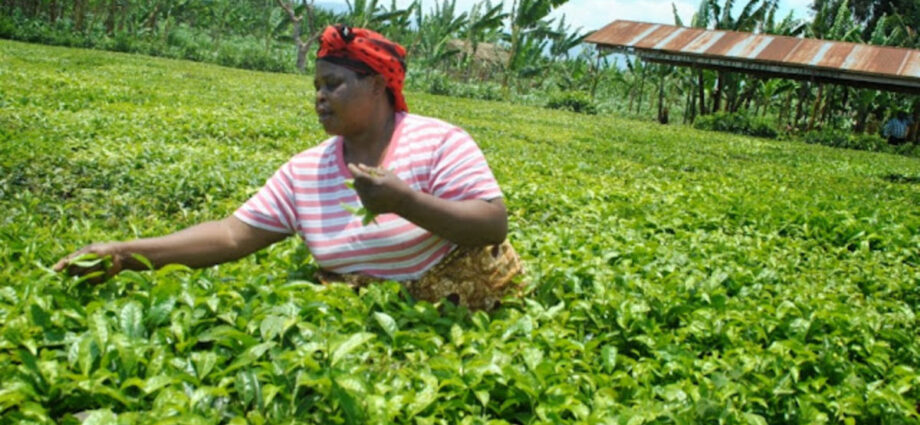Tanzania Government aims to increase tea production
Compared to the seeds currently in use, the seeds found by the Tea Research Institute of Tanzania (TRIT), have a great potential to survive drought and allow farmers to produce bumper harvests.
The newest seeds that have been released are TRIT201/16, TRIT201/44, TRIT201/55, TRIT201/43, TRFK303/178, TRFK430/63, TRFK301/5 and TRFK381/5.
The government aims to increase tea production from the 17,615 tonnes produced by April 2022, equivalent to 58.72 percent of the target- to 30,000 tonnes in the 2022/23 season with the introduction of the new seeds.
The seeds have been released at a time when global earnings from tea sales have increased to $24.86 million in 2021 from $23.59 million in 2020/21.
However, the new 2022 National Bureau of Statistics report indicates that the earnings from tea sales have gone down to Sh6,257.3 billion in 2021 compared to Sh6,752.4 billion earned in 2020.
The report shows that the earnings from foreign sales increased to Sh3,418.9 billion (2017), Sh3,435.7 billion (2018) and Sh5,043.1 (2019).
The TRIT director of research, Dr Daniel Mgori, says the seeds will help increase productivity in tea cultivation.
He says the new seeds were introduced after many years of research and that farmers will now gain a lot from the quality of the seeds on the market.
“Many regions that grow this crop have been experiencing long dry spells due to insufficient rainfall during the November-April rainy season. This calls for the need to have drought-resistant seeds,” says Mgori.
He adds; “A detailed assessment in various environments has resulted in the introduction of the seeds, which have officially been approved by the Tanzania Official Seed Certification Institute (TOSCI) for small and large scale farmers,” he says.
According to him, TRIT will produce the seeds in large quantities through its nurseries in order to meet the farmers’ demands. He thanks the government for providing his institute with funds for the production of the seeds.
Dr Mgori says that by June 2022, at least 1.5 million seedlings had been produced, and the same amount will be produced in the 2022/2023 season to enable more farmers to focus more on tea cultivation.
He also notes that TRIT has been testing soil health so as to enable farmers to apply fertilisers correctly, adding that different tests have been taken on different types of soil.
“We have been advising tea farmers on the amount of fertiliser to use in accordance with the needs identified following the research we conducted,” he says.
The expert also says that TRIT continues to innovate friendly and simple technologies that will enable the small tea farmer to practice irrigation in order to strengthen tea cultivation.
“This strategy will enable the farmers to get more benefits after focusing on production during the dry seasons,” he notes.
A senior agricultural officer at TRIT, Magreth Katole, says the technology transfer unit, which has been offering training to farmers and extension officers, will enable them to identify the best principles of tea cultivation.
“This unit helps bring technology to farmers by providing them with training so that they can learn in practice through demonstration farms that help increase productivity to the farmers,” says Katole.
She mentions the areas involved in tea farming as including the Southern Highlands in Iringa, Mbeya, and Njombe regions; the Usambara Mountains, especially in Muheza and Lushoto districts; the Lake Zone, especially in Muleba and Bukoba rural districts; and Tarime District in Mara region.
TRIT Director General, Emmanuel Simbua says, apart from being drought tolerant, the seeds also have a delicious taste.
Higher yields
“These new seeds, which also produce higher yields compared to those that have been used for many years, will benefit Tanzanian farmers more by getting a good price in the market and continue to promote the Tanzanian product in the international market,” he says.
For his part, Tanzania Tea Board Director, Nicolaus Mauye says tea production dropped last year due to the long dry spells caused by insufficient rainfall.
According to him, the new seeds can produce five tonnes of yield per hectare compared to the long-established seeds that are capable of producing two and a half tonnes of the same per hectare.
“The high-quality tea will increase the value of tea sales from $50 million per year to $100 million in the next four to five years,” he says.
Government’s statement
Tabling his ministry’s budget for the 2022/23 financial year, Agriculture Minister, Hussein Bashe said the Tanzania Smallholders Tea Development Agency produced 843,066 seedlings in the 2021/22 season, equivalent to 108.8 percent of the goal of producing 750,000 seedlings.
Among the seedlings, said the minister, Rungwe District produced 232,000, Njombe (152,047), and Mufindi produced 459,019.
Mr Bashe, who doubles as the Nzega Urban MP, said six million seedlings have been planted in nurseries through the Njombe Outgrower Service Campaign (NOSC) project.
He added that more than seven million better seedlings that were being cared for in 45 nurseries in Njombe District through NOSC (5,100,000) and the Mufindi Outgrower Project (2,000,000) had been used.
He noted that the seedlings were used to fill gaps in an area of 60 hectares as well as replant an area of 200 hectares in the Igominyi-Njombe division.
He said a total of 13.92 million seedlings were produced through crop boards in 2021/22 while 7.10 million seedlings were distributed to farmers.
“The ministry plans to produce 15 million tea seedlings in the 2022-23 season through the Tanzania Smallholders Tea Development Agency, the private sector, and development partners.”
Of these, 7.5 million seedlings will be used for the expansion of tea plantations in Mufindi, Njombe, and Kilolo Districts, while another 7.5 million seedlings will be used to fill the gaps in the smallholder farms in the districts of Lushoto, Korogwe and Bukoba,” he said.
He said a total of 17 large farms have been inspected and that mobilisation has been done to revive the 650-hectare farms of smallholder farmers in Mbeya, Iringa, Njombe, and Tanga Regions.
Bashe said that by April, 2022, 201 hectares of smallholder farmers had been revived in Njombe and Mbeya regions, while 200 hectares of new tea farms had been established in Njombe Region.
Tea auction launch
Mr Bashe said the ministry, in collaboration with the Tanzania Mercantile Market, will start a tea auction in the Kurasini area in Dar es Salaam, which will reduce business costs following the use of tea auctions in Mombasa.
He also said the envisaged auction will strengthen the use of Dar es Salaam port as well as create more job opportunities.
“The launch of the auction will go simultaneously with the strengthening of bilateral ties with the countries of Rwanda, Burundi, and Pakistan in order to find buyers who will participate in the auction. A total of Sh2 billion has been set aside to achieve the goal,” he said.
What the farmers say
The chairman of the Union of Smallholder Tea Farmers in Tanzania, Mr Santino Edson, says the introduction of drought-resistant seeds will be of great help to tea farmers in the country.
“It is a great achievement for TRIT to provide us with new seeds, unlike in the past where we used to rely on seeds from outside Tanzania, especially from Kenya and Malawi,” he says.
A tea farmer from Njombe Region, Mr Angelus Nziku, says the introduction of the new seeds will benefit the farmers because the seeds have the ability to produce bumper harvests.
“The rains that we used to get between November and June are now expected in December up until April next year, which is likely to cause many seedlings to dry on the farms,” fears Nziku.
Share this news
This Year’s Most Read News Stories

Tanzanian insurance firms upbeat after first quarter business growth
Total gross written premiums for the insurance industry have increased by 13.68 percent in the first quarter of 2024, with small and medium-sized companies showing higher growthContinue Reading

President Samia takes on Tanzania’s web of corruption
The President takes on the web of corruption in the Tanzanian government and quasi-government institutions flagged by the newest report by Controller & Auditor-General Charles Kichere. Continue Reading

Tanzania Declares End of Marburg Virus Disease Outbreak

Tanzania today declared the end of Marburg virus disease outbreak after recording no new cases over 42 days since the death of the last confirmed case on 28 January 2025.
The outbreak, in which two confirmed and eight probable cases were recorded (all deceased), was the second the country has experienced. Both this outbreak, which was declared on 20 January 2025, and the one in 2023 occurred in the north-eastern Kagera region.
In response to the latest outbreak, Tanzania’s health authorities set up coordination and response systems, with support from World Health Organization (WHO) and partners, at the national and regional levels and reinforced control measures to swiftly detect cases, enhance clinical care, infection prevention as well as strengthen collaboration with communities to raise awareness and help curb further spread of the virus.
Growing expertise in public health emergency response in the African region has been crucial in mounting effective outbreak control measures. Drawing on experience from the response to the 2023 Marburg virus disease outbreak, WHO worked closely with Tanzanian health authorities to rapidly scale up key measures such as disease surveillance and trained more than 1000 frontline health workers in contact tracing, clinical care and public health risk communication. The Organization also delivered over five tonnes of essential medical supplies and equipment.
“The dedication of frontline health workers and the efforts of the national authorities and our partners have paid off,” said Dr Charles Sagoe-Moses, WHO Representative in Tanzania. “While the outbreak has been declared over, we remain vigilant to respond swiftly if any cases are detected and are supporting ongoing efforts to provide psychosocial care to families affected by the outbreak.”
Building on the momentum during the acute phase of the outbreak response, measures have been put in place to reinforce the capacity of local health facilities to respond to potential future outbreaks. WHO and partners are procuring additional laboratory supplies and other equipment for disease detection and surveillance and other critical services.
Marburg virus disease is highly virulent and causes haemorrhagic fever. It belongs to the same family as the virus that causes Ebola virus disease. Illness caused by Marburg virus begins abruptly. Patients present with high fever, severe headache and severe malaise. They may develop severe haemorrhagic symptoms within seven days.
In the African region, previous outbreaks and sporadic cases have been reported in Angola, the Democratic Republic of the Congo, Ghana, Kenya, Equatorial Guinea, Rwanda, South Africa and Uganda.
Source: allafrica.com










